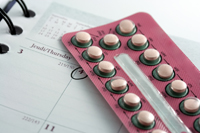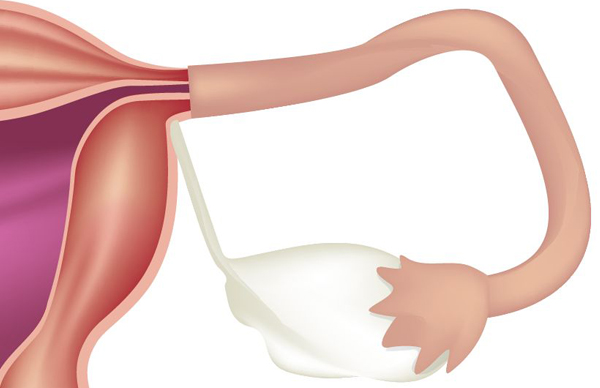The effects the four hormones estrogen, progesterone, follicle stimulating hormone (FSH), and luteinizing hormone (LH) have on your body.
Although many women take it for granted that their ovaries play an important role in the female reproductive system, the majority of them do not understand how essential their ovaries are to the proper functioning of the female body. In fact, women who suffer through Polycystic Ovarian Syndrome (PCOS) often do not realize the importance of their ovaries until they begin to research their condition.
Every day, between five and ten percent of all women struggle with the symptoms of Polycystic Ovarian Syndrome (PCOS), fighting an uphill battle for normalcy and health. Polycystic Ovarian Syndrome (PCOS) is a hormonal condition, one that is rooted in an imbalance in the levels the male and female reproductive hormones.
+ Click here to learn about the all natural PCOS 5-Element Solution
+ Click here to read more articles about PCOS and Hormones
Causes
What role do the ovaries play in PCOS?
As surprising as it may be, it is true that women do have male reproductive hormones naturally in their system (and men have female reproductive hormones). The proper balance of these hormones is what maintains a functioning reproductive system in both men and women. But when a woman begins to produce too many androgens (male hormones) she can quickly develop Polycystic Ovarian Syndrome (PCOS) and start to experience some of the devastating symptoms this condition can produce. Some of these symptoms include: infertility, hair loss, polycystic ovaries, abdominal and pelvic pain, hirsutism, depression, anxiety, acne, dandruff, dry skin, skin tags, and fatigue.
How Do the Ovaries Fit Into the Scheme of Things?
The ovaries are involved in Polycystic Ovarian Syndrome in three major ways:
- They can develop the tell-tale ovarian cysts that point to the condition in many women (although these cysts are not required for a firm diagnosis).
- They release the female sex hormones, and the imbalance of these hormones, namely estrogen and progesterone, is characteristic of Polycystic Ovarian Syndrome (PCOS).
- When hormone levels are off balance the ovaries do not release fully matured eggs—resulting in a lack of ovulation and the presence of infertility, one of the most devastating symptoms of the condition.
This being said, it is clear that the ovaries play two very important roles: the role of egg storehouse and the role of hormone manufacturer. Estimated to be the size of an almond, these relatively small glands play a major part in a woman’s life.

How the Ovaries Function
On the day she is born, a woman’s ovaries hold all of the eggs she will ever produce. Stocked with between 200,000 and 400,000 eggs, starting at puberty the ovaries will release one egg every month in anticipation it will be fertilized and a baby will be created. Ovulation, or the release of an egg every month, will continue until a woman reaches menopause, at which time her ovaries will stop releasing eggs and will become a bit smaller.
In order to properly ovulate, ovaries must have the necessary amounts of the female sex hormones they produce. These hormones trigger the preparation and release of each egg, but if the levels of the sex hormones present in a woman’s body are off kilter, the ovulation process can be disrupted. This is exactly what happens in women who have Polycystic Ovarian Syndrome.
What Hormones Do the Ovaries Produce?
The female reproductive system depends on several different hormones to function properly; however, there are four major hormones that must be balanced and accurately produced in order for ovulation, conception, and the development of a child to occur. These four include: estrogen, progesterone, follicle stimulating hormone (FSH), and luteinizing hormone (LH). FSH and LH are produced in the pituitary gland, a small gland in the brain; estrogen and progesterone are generated within the ovaries themselves. Sex hormone production occurs elsewhere in the body as well. Estrogen and progesterone are both produced in smaller amounts in the adrenal glands. During pregnancy the placenta secretes progesterone. Other sources of estrogen include fat cells, arterial walls, and the brain.
Estrogen: When you think of characteristics generally considered to be feminine, you are thinking of those caused by estrogen. From body shape to hormonal patterns, estrogen is the major female sex hormone. A few of the things this hormone is responsible for include:
- The development of the female reproductive system, including the uterus, ovaries, and fallopian tubes.
 The proper development of the skeletal system, and the ability of the body to complete this development.
The proper development of the skeletal system, and the ability of the body to complete this development.- Maintenance of the monthly menstrual cycle, including the thickening of the endometrium in preparation for the release of the egg.
- Growth and development in pregnancy.
- Development of female ‘secondary sex characteristics’ like breasts, body hair, and weight distribution.
- Production of fluids within the female reproductive system and vaginal lubrication, resulting in the ideal pH to promote the survival of sperm during the time the female partner is most fertile.
- Estrogen’s effects during pregnancy are less clear but may include initiation of the breasts to begin lactation.
Progesterone: The predominant hormone after ovulation, progesterone is released by the empty follicle from which an egg has just been released. This empty follicle is called the corpus luteum. When it is released, progesterone stimulates the uterus to prepare for the implantation of a fertilized egg. If the egg does not become fertilized, meaning conception does not take place, the corpus luteum involutes causing a sharp drop in hormone levels. Subsequently, the uterus sheds its lining and the egg during menstruation. Some other responsibilities of progesterone include:
- Supporting pregnancy after conception has taken place.
- Instigating and maintaining the growth of the endometrium (uterine lining).
- Keeping the uterus in a relaxed state, avoiding the complications caused by early contractions.
- Strengthening the mucosal covering on the cervix to protect from infection.
- Inhibiting further ovulation taking place during pregnancy.
- Promoting the development of milk-producing glands in the breast in preparation for lactation.
Both estrogen and progesterone are important aspects of a well balanced reproductive system. In women with Polycystic Ovarian Syndrome (PCOS), sometimes the levels of these two substances are too low when compared to the levels of androgens, or male hormones, which are present in the system.
Symptoms
Have you noticed symptoms that might point to PCOS?
PCOS creates a great many different physical issues that vary from woman to woman. This combination of symptoms can make PCOS difficult to diagnose.
Some commonly seen symptoms of PCOS include:
- Increased hair growth (hirsutism)
- Absent periods
- Heavy periods
- Irregular menstruation
- Painful period cramps
- Male pattern baldness
- Noticeable weight gain or obesity
- Headache
- Vision changes
- Acne
- Dandruff
- Skin discolorations
- Fatigue
- Mood swings
- Ovarian cysts
- Infertility
Other possible indicators of PCOS can include excess male hormones that are defined by elevated androgen levels in the blood, insulin resistance, and elevated serum levels of luteinizing hormone (LH). It is important to get a definitive diagnosis of PCOS because long-term risks of PCOS can be serious health conditions such as type 2 diabetes and cardiovascular disease.
Treatment Options
How Can Women With PCOS Control Their Hormones?
The problem is that controlling the production and release of hormones can be very difficult, and is not always possible; however, there are several treatment options that women with Polycystic Ovarian Syndrome (PCOS) can consider.

First and foremost, doctors can prescribe birth control pills to women with this condition. Although birth control pills do not affect the underlying cause of PCOS, they regulate the levels of estrogen and progesterone and help women regain a regular menstrual cycle, which can improve the quality of life of women with PCOS.
Additionally, supplemental progesterone can be used for women whose levels are low. There are several different ways it can be taken, including as a pill, a vaginal suppository, or a cream. Not only can an increase in deficient progesterone levels increase the likelihood of conception, it can also help prevent endometrial cancer, and for pregnant women, progesterone supplementation can help prevent miscarriage.
Natural Therapies
Getting to the Core of the Problem
Although birth control pills and progesterone supplements can help women with Polycystic Ovarian Syndrome (PCOS) regain a bit of normalcy in their lives, and maybe even overcome their infertility and conceive a child, as well as maintain a healthy pregnancy, these remedies do nothing to remedy an underlying issue: Insulin Resistance. A common cause of Polycystic Ovarian Syndrome (PCOS), Insulin Resistance occurs when the body’s cells become insensitive to the attempts of insulin to break down blood sugar into energy. When this occurs, blood sugar levels spike and hormone levels are thrown off balance, causing the imbalance that sparks Polycystic Ovarian Syndrome (PCOS) and all of its highly undesirable symptoms.
Unfortunately for the millions of women who struggle with this condition on a daily basis, there is no magic medicine that can cure Insulin Resistance. It is reversible, but only through old fashioned hard work, which entails a nutritious diet, a rigorous exercise program, and targeted nutrition supplements.
The diet and exercise programs recommended for women with Insulin Resistance are subjective, relying largely on their own dietary needs and physical limitations; however, all women should abide by the following guidelines:
 Exercise as much as possible without going overboard. This can mean anything from a thirty minute walk around the neighborhood to hitting the gym five times per week, depending on individual physical capabilities.
Exercise as much as possible without going overboard. This can mean anything from a thirty minute walk around the neighborhood to hitting the gym five times per week, depending on individual physical capabilities.- Stay away from simple carbohydrates and sugary foods that will increase insulin production and exacerbate Insulin Resistance. Reduce overall intake of carbohydrates.
- When you do eat carbs, choose complex carbohydrates high in fiber and low on the glycemic index to combat Insulin Resistance and the high cholesterol it is capable of causing.
- Get involved in a support group or network with other women who have Polycystic Ovarian Syndrome (PCOS), as emotional support is key in overcoming this illness.
Although it can seem very difficult to regulate hormone levels and create a normal life when dealing with Polycystic Ovarian Syndrome (PCOS), there are ways to balance hormones and regain the sense of normalcy this challenging condition almost always takes from its victims.
Next Steps
- Take the PCOS Quiz! Get your score and assess your hormone health risks.
- Join our Facebook Sisterhood Group Pose your questions to this group of like-minded women. Get the answers to your questions and the support you need.
- Checkout the Hormone Reset. Guided Practices to eliminate anxiety, lose weight and boost energy.
We are committed to helping women reverse their symptoms of hormone imbalance – a major cause of excess weight gain, adult acne, unwanted facial hair, depression, anxiety, and heartbreaking female infertility.
©Insulite Health empowers women with hormone imbalance to transform their lives through a process of healing with the Natural Hormone Solution –a complete solution for helping women reverse the symptoms hormone imbalance..



 The proper development of the skeletal system, and the ability of the body to complete this development.
The proper development of the skeletal system, and the ability of the body to complete this development. Exercise as much as possible without going overboard. This can mean anything from a thirty minute walk around the neighborhood to hitting the gym five times per week, depending on individual physical capabilities.
Exercise as much as possible without going overboard. This can mean anything from a thirty minute walk around the neighborhood to hitting the gym five times per week, depending on individual physical capabilities.